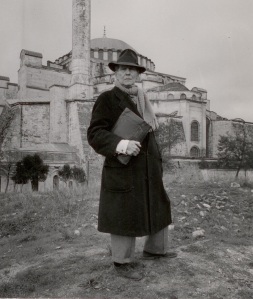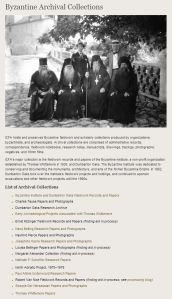The Image Collections and Fieldwork Archives (ICFA) is pleased to announce the publication of four new finding aids on the department’s archival collections webpage.
ICFA staff completed the archival processing and finding aids for the following collections:
- Thomas Whittemore Papers, ca. 1875-1966
- Early Archaeological Projects Associated with Thomas Whittemore, 1910s-1930s
- Byzantine Institute and Dumbarton Oaks Fieldwork Records and Papers, ca. late 1920s-2000s
- Paul Atkins Underwood Research Papers, ca. 1936-1950
Additionally, ICFA has revised existing finding aids for collections produced by Byzantine scholars and/or Dumbarton Oaks staff, including:
- Hans Belting Research Papers and Photographs, ca. 1960s-1980s
- Nathalie P. Scheffer Research Papers, 1940-1954
- Josephine Harris Research Papers and Photographs, ca. 1950s-1970s
- Sirarpie Der Nersessian Papers and Photographs, 1939-1966

Posing in front of the Hagia Sophia, where he oversaw the large scale restoration and conservation of its interior mosaics.
Featured prominently in three of our collections, Thomas Whittemore (1871-1950) is ICFA’s leading protagonist. The Thomas Whittemore Papers documents his teaching career at Tufts College, Columbia University, and New York University, which spanned the late 1890s through the late 1920s. During those years, Whittemore also pursued humanitarian work in Bulgaria, Russia, and France, particularly during World War I and the Russian Revolution in 1917.
But, Whittemore’s endeavors did not stop there. In 1911, he joined the British-run Egypt Exploration Society (EES; formerly known as the Egypt Exploration Fund) on several expeditions as an American representative. The Early Archaeological Projects Associated with Thomas Whittemore focuses on Whittemore’s participation in EES fieldwork at Abydos and Amarna in Egypt, and his financial contributions to excavation projects in Bulgaria in the 1920s.
In 1930, he founded the Byzantine Institute (commonly known as the Byzantine Institute of America), a non-profit organization whose mission was to conserve, restore, study, and document monuments, sites, architecture, and arts in the former Byzantine Empire. Whittemore’s work as founder and director of the Byzantine Institute is fully documented and described in the Byzantine Institute and Dumbarton Oaks Fieldwork Records and Papers. In this collection, researchers may study the products of the Byzantine Institute’s fieldwork projects through administrative records, photographs, drawings, and fieldwork notebooks, especially the restoration and conservation initiatives at major Byzantine monuments in Istanbul, Turkey such as the Hagia Sophia and Kariye Camii. Additionally, the records document the Byzantine Institute’s dissolution and incorporation into Dumbarton Oaks in 1962 and the fieldwork operations supported by Dumbarton Oaks in Turkey, Cyprus, and present-day Macedonia from the 1960s to the 2000s.
ICFA’s holdings also include the Paul Atkins Underwood Research Papers, which record Underwood’s scholarly career before he became the Field Director of Byzantine Institute following Whittemore’s death in 1950. The collection focuses on Underwood’s research projects as a Junior Fellow and Associate Professor of Byzantine Art and Archaeology at Dumbarton Oaks in the 1940s and 1950s, including a study of the iconography of “The Fountain of Life in Manuscripts of the Gospels” and the reconstruction of the Church of the Holy Apostles in Istanbul. In addition, ICFA holds research papers and photograph collections compiled by scholars and staff at Dumbarton Oaks on topics such as Palaeologan manuscript illumination, Russian art and iconography, Coptic architectural sculpture, and Armenian manuscript illuminations.
In future months, ICFA plans to complete the archival processing of the Robert Van Nice Fieldwork Records and Papers and the Margaret Alexander Fieldwork Papers. While these projects are still in progress, ICFA staff and interns have created online resources to document these collections, including:
- Processing blog for Robert Van Nice by Clare Moran
- Online exhibit, “From Clearing to Cataloging: The Corpus of Tunisian Mosaics,” by Rona Razon and Robin Pokorski
More importantly, ICFA is currently moving its long-form finding aids to an open-source web-based collection management system (International Council on Archives Access to Memory; ICA-AtoM) for increased accessibility. While the change has opened the door for lively debates about archival description and “More Product, Less Process,” this challenge has definitely been an educational and exciting journey for the staff and interns in ICFA.
For more information about ICFA’s ongoing activities and projects, please “friend us” on the Dumbarton Oaks Library and Archives Facebook page.


It has been a pleasure to review these materials and to see some of the wonderful images. Thank you for making them available.
You’re welcome and thank you for the kind words.
Pingback: New Finding Aids and Inventories from ICFA | icfa